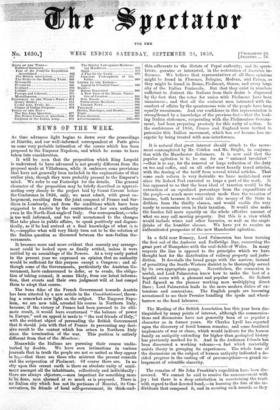NEWS OF THE WEEK.
As time advances light begins to dawn over the proceedings at Biarritz, and our well-informed correspondent at Paris gives us some very probable intimation of the course which has been proposed to the Emperor Napoleon, and which he seems to have taken into consideration.
It will be seen that the proposition which King Leopold is understood to have advanced is not greatly different from the proposal made at Villafranca, while it embraces some provisions that have not generally been include'd in the explanations of that earlier plan, though they were probably present to the Emperor's mind. We refer to our Postscript for the details. The general character of the proposition may be briefly described as approxi- mating very closely to the project laid by Count Cavour before the Conference in 1856, only, we must admit, with great en- largement, resulting from the joint conquest of France and Sar- dinia in Lombardy, and from the conditions which have been suggested to Austria by the contraction of her own authority even in the North-East angle of Italy. Our correspondent,—who ,is too Well informed, and too well accustomed to the changes that take place in public affairs, to speak positively and dogma- tically, as if he had arrived at a final knowledge of what is to be,—supplies what will very likely turn out to be the solution of the Italian question as discussed between the non-Italian Go- vernments.
It becomes more and more evident that scarcely any arrange- ment could be looked upon as finally settled, unless it were ratified by an assemblage of the Powers. At a very early period in the present year we expressed an opinion that no authority would be sufficient for this purpose except a Congress ; and al- though some of the Governments, particularly the Austrian Go- vernment, hain endeavoured to defer, or to evade, the obliga- tion of taking counsel, it seems likely, from our latest informa- tion, that events and their own judgment will at last compel them to adopt that course.
The bona fides of the French Government towards Austria has been attested by a new article in the Conatitutionnel, throw-
ing a somewhat new light on the subject. The Emperor Napo- leon,. we are now told, arrested his course in Northern Italy, because, if the victory of France had been pursued to its ulti- mate result, it would have overturned " the balance of power in Europe," and an appeal is made to " the real friends of Italy," with the evident object of persuading the British Government that it should join with that of France in preventing any deci- sive result to the contest which has arisen in Northern Italy since the termination of the war. This position is entirely different from that of the Moniteur.
Meanwhile the Italians are pursuing their course undis- turbed by doubts. We have seen intimations in various journals that in truth the people are not so united as they appear to be,—that there are those who mistrust the present councils and the cooperation of Piedmont. Of course there are. In no city upon this errant earth is there an absolute unity of senti- ment amongst all the inhabitants, collectively and individually : there are always objectors,—men impatient for something more to be done, men alarmed at so much as is proposed. There is no Italian city which has not its partisans of Mazzini, its Con- servatives, its friends of local self-government, its thick-and-
thin adherents to the dictate of Papal authority, and its specu- lators, genuine or interested, in the restoration of Austrian in- fluences. We believe that representatives of all these opinions might be found in Florence, Bologna, Modena, and Parma, as they might be found in Rome, Piedmont, Genoa, and every large city of the Italian Peninsula. But that they exist in numbers sufficient to distract the Italians from their desire is disproved by the fact that the votes for union with Piedmont have been unanimous ; and that all the eminent men intrusted with the conduct of affairs by the spontaneous vote of the people have been
equally unanimous. And our confidence in this representation is strengthened by a knowledge of the previous fact—that the lead- ing Italian statesmen, cooperating with the Piedmontese Govern- ment, had been preparing precisely for this unity of action. In the conferences of 1856, France and England were invited to patronize this Italian movement, which has not become less en- ergetic by being treated with non-interference.


























